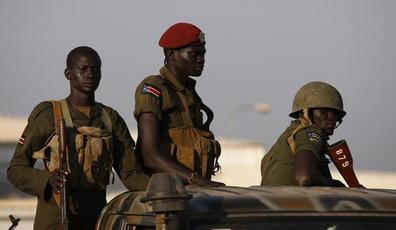Sudanese army rules out intervention in S. Sudan conflict
January 19, 2014 (KHARTOUM) – The Sudanese Armed Forces (SAF) dismissed suggestions that it could intervene in the ongoing military conflict in South Sudan saying that there is no special bilateral treaty allowing it to do so.

He reiterated denial that Khartoum and Juba agreed to deploy joint forces to protect oilfields adding that any military arrangements must be decided by leaders of both countries and not the armies.
On the protection of Sudanese oil workers requested by Juba recently, al-Sawarmi said that the responsibility for this lies with Juba as is the case with any foreigner within their state.
On Friday, South Sudan’s defence minister Kuol Manyang Juuk told Reuters that his government may ask Sudan for military assistance if the current conflict threatens the young nation’s oil fields.
Uganda has publicly announced that its troops are fighting alongside SPLA against rebel forces led by former Vice President Riek Machar.
Following president Omer Hassan al-Bashir’s visit to Juba earlier this month, Sudan’s foreign minister claimed that establishing a joint force of SAF and South Sudan’s army SPLA had been discussed, but this was statement was later retracted.
“Until now we have not asked the Sudan government to send in their forces” to protect South Sudan’s oil fields, Juuk said.
“Should there be a threat, anything threatening the oil field, definitely the government of South Sudan may ask the Sudan government to come in and support,” he added.
Many members of staff at the oil fields have been evacuated since the fighting began and production has slipped from 245,000 barrels per day down to 200,000 bpd, leading to Juba asking Khartoum for engineers to address the decline and ensure production continues.
When the South seceded from Sudan in 2011 following decades of civil war, it took with it 75% of production, but still relies on its northern neighbor to export its crude.
The Sudanese ambassador in Juba Mutrif Sideeg told the pro-government Ashorooq TV today that South Sudan did not request military help to protect oil wells.
“Sudan and South Sudan have agreements and other specific mechanisms for the protection of borders to check and control if borders are penetrated,” Sideeg said.
He stressed that any other requests are governed by protocols and will be considered by the legislative and executive institutions when made.
(ST)
